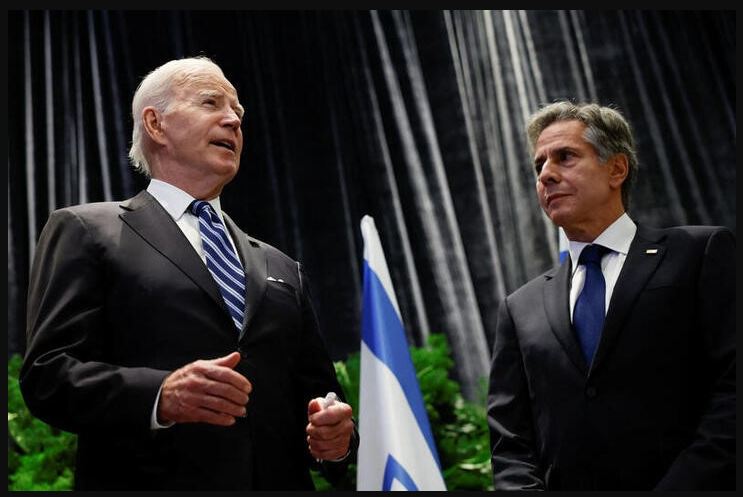Inside Biden’s Israel-Hamas war cabinet
Washington (Reuters) – U.S. President Joe Biden is relying on a small group of veteran advisers to help navigate the Israel-Hamas conflict that has killed thousands, split Western allies and risks spiraling into a wider war.
Antony Blinken – Shuttle Diplomat
A long-serving foreign policy adviser to Biden, Blinken, 61, has traveled to the Middle East three times since the conflict erupted, including six visits to Israel, juggling the need to show solidarity with Israel after the Hamas attacks with an effort to tamp down regional tensions.
Shuttling between Israel and neighboring majority-Muslim states, he has pushed back on calls for a ceasefire, while also pressing Israel to allow humanitarian aid into Gaza – notably during nine hours of negotiations with Israeli Prime Minister Benjamin Netanyahu and his war cabinet in October.
Often seen as a policy wonk, the soft-spoken Blinken invoked his Jewish heritage and held emotional encounters in Tel Aviv with survivors of the Oct. 7 attacks. A father of two young children, he has spoken repeatedly about being personally affected by images of children suffering on both sides of the conflict.
Jake Sullivan – The Last Guy In The Room
Biden often turns to Sullivan, the White House national security adviser, when he is considering final options and looking for advice and counsel.
“He develops and puts forward the policy options before the president for him to decide,” said one U.S. official. “Jake is often that last guy in the room giving the president his advice and counsel and his recommendations on the way forward.”
Sullivan, 47, was national security adviser for Biden when he was vice president and deputy chief of staff to then-Secretary of State Hillary Clinton.
He gathers policy options from across government agencies and prepares them for Biden to consider, the traditional role of the national security adviser.
“He’s really kind of the conductor of a very vast and fast-moving orchestra,” the official said.
Brett Mcgurk – The Negotiator
When Biden needed an envoy to help negotiate the release of hostages seized by Hamas militants during their deadly rampage through towns in southern Israel on Oct. 7, he sent Brett McGurk, the 50-year-old National Security Council coordinator for the Middle East and North Africa.
McGurk, who held national security roles for presidents George W. Bush, Barack Obama and Donald Trump, is known for diving into the details with top officials across the Middle East.
Before the Israel-Hamas conflict, McGurk led negotiations to strike a deal for Saudi Arabia to normalize relations with Israel in exchange for stronger defense commitments for the Saudis from the United States. The Hamas war froze that effort.
When Israel and Hamas agreed to a hostage swap in a deal mediated by Qatar on Nov. 21, McGurk was in Doha meeting with the Qatari prime minister to work out the deal’s structure, U.S. officials said.
McGurk relies on a wide array of contacts inside and outside governments in the region.
“The president and Jake (Sullivan) rely heavily on Brett’s expertise and his ability to pick up the phone to talk to whoever he needs to, to move things along,” said the U.S. official.
Bill Burns – The Invisible Man
Long before he became the United States’ chief spymaster, CIA Director Bill Burns handled some of the most sensitive U.S. national security issues, including the secret talks that led to the Iran nuclear deal, as a career diplomat.
It’s a role that Burns, 67, still performs for Biden, most recently traveling to Qatar to meet the head of Israel’s Mossad spy agency and the Qatari prime minister to discuss how to free the hostages seized by Hamas.
Since his 2021 swearing-in as CIA director, Burns has made at least four dozen foreign trips, the vast majority in secret, said a source familiar with the matter. Those have included Moscow in 2021 before Russia invaded Ukraine and Ankara in 2022 to warn Russia’s intelligence chief against using nuclear weapons against Ukraine.
The CIA declined comment on Burns’ travel.
Burns is brought in “when things need to get done quietly,” said a U.S. official, describing his approach as “more subtle, more driven toward issues of intelligence and what we know and what we don’t know and how do we make up the difference.”
Lloyd Austin – Stark Warnings
By the time U.S. Defense Secretary Lloyd Austin traveled to Israel after Hamas’ Oct. 7 assault, he had already spoken with his Israeli counterpart on at least four occasions in just six days. That heavy pace has kept up ever since.
The calls with Yoav Gallant, 24 of which have been publicly disclosed by the Pentagon, can often last anywhere from 30 minutes to an hour, a senior U.S. defense official said.
In Israel, Austin, 70, compared Hamas to the Islamic State militants he helped combat as a U.S. Army general before retiring. Hamas, like ISIS, offered nothing but “but zealotry and bigotry and death,” he said.
He has also warned Israel about the failure to protect civilians in Gaza and the risks of radicalization. “If you drive them into the arms of the enemy, you replace a tactical victory with a strategic defeat,” he said.
Kamala Harris – Post- Conflict Plans
Vice President Kamala Harris, who recently met with several Arab leaders on the sidelines of the COP28 climate conference, has focused her attention extensively on the thorny issue of post-conflict planning.
In Dubai, Harris stressed three elements for a post-conflict Gaza: reconstruction, security and governance.
“No forcible displacement, no reoccupation, no siege or blockade, no reduction in territory and no use of Gaza as a platform for terrorism,” she said.
Palestinian Authority security forces must be strengthened to assume security responsibilities in Gaza and the West Bank, she said. “We want to see a unified Gaza and West Bank under the Palestinian Authority (PA), and Palestinian voices and aspirations must be at the center of this work,” she said.
Jon Finer – Asking Questions
Sullivan relies heavily on his deputy national security adviser, Jon Finer. Finer, 47, previously served as special adviser for the Middle East and North Africa and foreign policy speechwriter for Biden when he was Obama’s vice president.
“He … is frequently the guy in the room who says ‘Hey this doesn’t make sense, have we thought about doing it this way?'” the official said.
As Sullivan’s deputy, Finer also helps coordinate among U.S. government agencies and helps develop and shape policy options.
He was John Kerry’s chief of staff when Kerry was Obama’s secretary of state, and was a foreign correspondent for the Washington Post, including from the Middle East.



